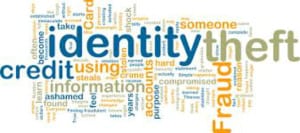 How to prevent identity theft. In our last blog we discussed Identity Theft: Are You at Risk? This week we’ll be discussing how to recognize if you’re a victim of identity theft.
How to prevent identity theft. In our last blog we discussed Identity Theft: Are You at Risk? This week we’ll be discussing how to recognize if you’re a victim of identity theft.
The best way to know how to prevent identity theft, or at least minimize the impact of identity theft, is to recognize the signs early. Monitor your hard copy or online financial accounts frequently. Check your credit report on a regular basis because unexpected changes to your credit information are often the first signs that you’ve been victimized by identity theft.
Knowing what to look for is how to prevent identity theft. These are the signs that you are a victim of identity theft:
- There are withdrawals from your bank account that you didn’t make.
- Your regular bank or credit card statements fail to appear.
- You notice that other mail is missing.
- You receive credit card statements or other bills in your name, which you did not apply for.
- Telephone calls or letters state that you have been approved or denied by a creditor that you never applied to.
- Collection agencies call you about debts that aren’t yours.
- A company that you have an account with had a data breach and your information was compromised.
- You find accounts and/or charges on your credit report that aren’t yours.
- You are denied a loan even though you believe that you have an excellent credit report.
How to prevent identity theft requires constant monitoring of the signs listed above. If you’ve been a victim of identity theft, sadly we can’t turn back the clock; but if you’re in financial jeopardy as a result and you have collection agencies hounding you, we can help.
Ira Smith Trustee & Receiver Inc. is an insolvency and financial restructuring practice for individuals and companies in the Greater Toronto Area (GTA) facing financial crisis. Our approach for every file is to create an outcome where Starting Over, Starting Now becomes a reality, beginning the moment you walk in the door. Contact us today, your Vaughan bankruptcy trustee, and put your financial problems behind you.
Watch for our next blog when we’ll be discussing Identity Theft – What To Do If You’re A Victim.

